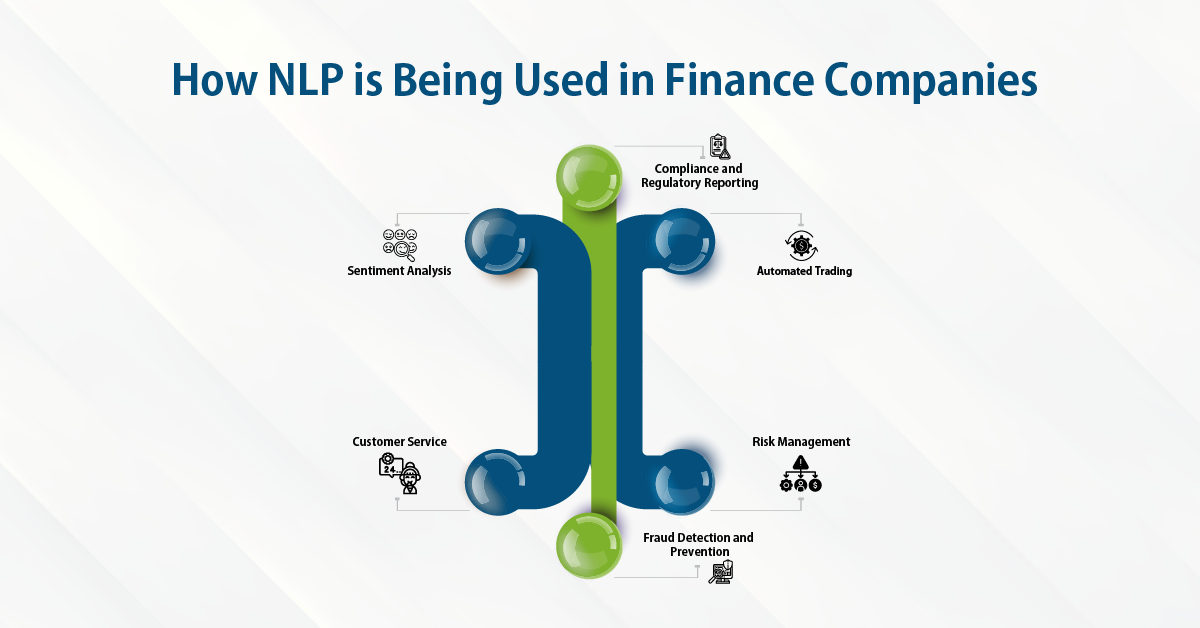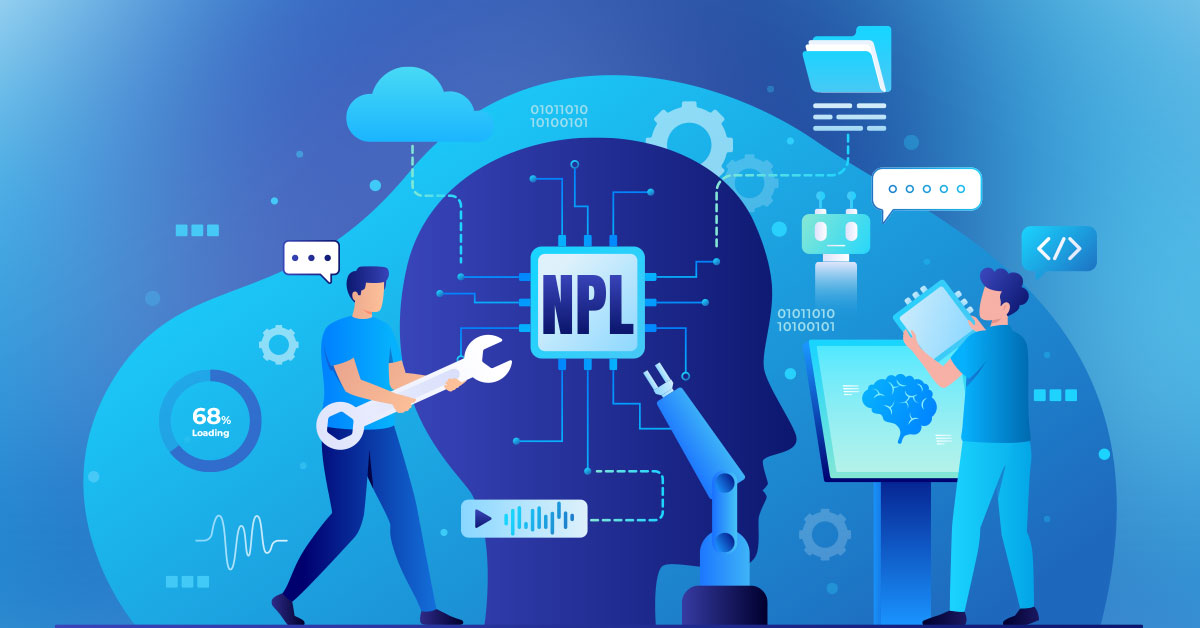The Power of Words: How NLP is Changing Finance

7 min read
Natural language processing, or NLP, has become a disruptive force, changing several industries and how humans interact with technology. One sector where language processing is very important is the finance business. Financial institutions, investors, and consumers are all becoming empowered by the capacity to evaluate enormous volumes of textual data. They can derive insightful conclusions from this data. In this blog article, we will discuss the power of language and how natural processing language is transforming the financial industry.
About Neuro-Linguistic Programming
The psychological method, known as neuro-linguistic programming, focuses on the relationship between our ideas, words, and actions. Richard Bandler and John Grinder created it in the 1970s to better understand and enhance communication and personal growth.
Three essential components comprise “neuro-linguistic programming”: language, programming, and neurology. The term “neurology” describes the study of the nerve system and brain that enable our perception of reality. We communicate both inwardly and with others through language. Additionally, programming describes the thought and behavior patterns we have acquired throughout our lives.
Neuro-Linguistic Programming teaches us how to use our minds more efficiently by understanding how we develop behaviors, make decisions, process information, and form beliefs. It also helps us understand how we interact with others.
Impact of Language on Finance
In finance, language is essential to every aspect of decision-making, from investment plans to market analysis. Natural Processing language has become a potent tool for understanding language’s function in finance. This transformation has occurred in the age of technology and data analytics.
NLP uses computational linguistics and algorithms to examine large amounts of text data, such as company reports, social media posts, and news stories, and extract insightful information. NLP data extraction enhances the utility of this data for trend analysis, sentiment analysis of the market, and making informed investing decisions.
It has a significant impact on finance through sentiment analysis. Sentiment analysis uses language’s tone and emotion to determine how the public feels about particular businesses or sectors. Investors can use this data to assess consumer sentiment, which could have an impact on the success of a product.
Additionally, it gives financial institutions an advantage by seeing trends and abnormalities in data that may influence investments. It allows them to take advantage of opportunities or hazards before they show up in stock prices. By keeping traders updated on events that could move the market, real-time news alerts and language analysis improve trading tactics.
However, Text analysis is limited since it depends on accurate and high-quality data. When dealing with inadequate or biased data, it may need help understanding the context or intent behind words. It could result in lost information or inaccurate analysis.
The Role of NLP in Finance: From Trading to Communication
The finance industry has quickly come to rely heavily on Natural Language Processing, which has completely changed the way financial institutions operate and communicate. The way finance professionals work, from trading to customer assistance and compliance, is being revolutionized by its language analysis capabilities.
Text analysis algorithms are used in trading to process massive volumes of real-time textual data, such as posts from social media and news articles. By seeing patterns, changes in market mood, and significant occurrences, this enables traders to make decisions more quickly and intelligently. Linguistic processing technology examines internet discussions about certain stocks and financial products to explore the emotional undercurrents that drive market movements.
Sentiment analysis-based automated trading systems have also become more popular. Understanding the prevailing public opinion of a specific asset class or stock helps traders minimize human prejudice and improve trading effectiveness.
The transforming power of NLP extends to financial organization communication. Chatbots with NLP capabilities are now essential to customer support services, processing a large volume of queries quickly and providing tailored answers. Utilizing natural processing language, virtual assistants are automating client-advisor interactions by providing automated answers to frequently asked questions. It improves customer satisfaction and frees up staff members for more intricate work.
Computational linguistics is also a priceless tool for risk and compliance management. To ensure regulatory compliance and detect potential risks and violations—a crucial step in avoiding fines and preserving their reputation—financial institutions use natural language processing-powered systems to comb through lengthy documents.
As long as there is continuous innovation, language processing will continue to be used in finance. The importance of neuro-linguistic programming will only grow in the finance industry as data becomes increasingly essential to decision-making. AI software developments will surely lead to more improvements and uses for NLP technologies, establishing it as a vital instrument in the continuing transformation of the banking sector.
How NLP is Being Used in Finance Companies

Natural language processing has been deeply influencing the financial sector in recent years and has completely changed how finance organizations function. It has several uses that are transforming the AI industry. The following are some of the main applications of NLP in financial services companies:
-
Sentiment Analysis
To assess market mood, financial institutions are using natural language processing to examine news stories, social media feeds, and financial reports. Investors can make better selections because of the insightful public opinion information provided by this sentiment research. Financial firms can identify market trends and evaluate the potential effects of outside influences on their investments by monitoring sentiment.
-
Customer Service
NLP-powered chatbots and virtual assistants are revolutionizing customer care in the finance sector. Natural Language Processing in AI-powered chatbots can do many jobs, from helping clients with more complicated problems to responding to routine account queries. These chatbots can understand and reply to consumer inquiries in a natural, human-like way through NLP algorithms, which improve the customer experience.
-
Compliance and Regulatory Reporting
Finance businesses’ compliance and regulatory reporting procedures can be greatly streamlined with computational linguistics. Finance professionals can minimize the risk of non-compliance and expensive penalties by automating the examination of regulatory papers and changes. It allows them to stay current on compliance standards. By identifying and extracting important information from documents, natural language processing enables businesses to comply with ever-changing rules.
-
Fraud Detection and Prevention
For finance organizations, fraud detection and prevention are ongoing challenges. NLP technologies facilitate the early detection of any fraudulent actions by assisting in the identification of abnormal patterns in textual data, including transaction descriptions, customer communications, and more. Financing firms can prevent losses and safeguard their clients by identifying irregularities and reporting suspicious transactions.
-
Automated Trading
Algorithmic trading relies heavily on NLP. Trades can be executed by automated trading systems based on market sentiment and news events by parsing and analyzing news releases, social media posts, and headlines in real time. Trading becomes more effective and responsive when these systems react quickly to shifting market conditions.
-
Risk Management
Through its assistance in evaluating and managing credit risk, market risk, and operational risk, processing language plays a crucial role in risk management for finance businesses. Financial institutions monitor and analyze textual data using NLP services for risk management, which helps them spot market opportunities and possible risks. Through ongoing monitoring and analysis of textual data sources, natural language processing can offer early warning signals and insights into potential risks, allowing firms to take proactive steps to reduce these risks.
Natural language processing transforms the financial sector through various applications that help with risk management, compliance and regulation, investment research, and customer service. Finance businesses will probably find ever more inventive and effective ways to use the power of words to their advantage as NLP technologies develop, ultimately resulting in a more secure and customer-focused financial experience.
Read more: NLP in Robotics: Enhancing Human-Robot Interaction
How Individuals Can Utilize NLP Techniques for Personal Financial Growth
By utilizing the power of words, Neuro-Linguistic Programming (NLP) is a powerful instrument for encouraging individual financial progress. It acknowledges that our ideas and beliefs have a big influence on our actions and behaviors. People frequently hold negative beliefs about money, like “I will never be successful” or “Money is evil.” These unfavorable thoughts hamper financial potential, but neuro-linguistic programming approaches can help recognize them and assist in replacing them with more empowering and positive attitudes.
It emphasizes the significance of establishing precise and well-defined financial objectives, which serve as guidance and inspiration for prudent financial choices. Affirmations and visualization help people program their brains to attain their goals.
Negative self-talk, such as “I’m not good with money” or “I’ll never get out of debt,” can lead to self-fulfilling prophecies that impede financial success. Our inner dialogue has a significant influence on our ideas, feelings, and behaviors. Language technology provides strategies for changing negative statements into positive ones to promote more productive cognitive processes. Emotional intelligence and practical skills are both necessary for effective money management. Money-related negative emotions like shame, remorse, or fear can make it difficult to make wise financial decisions. These feelings can be processed and let go of using linguistic processing techniques like timeline therapy and anchoring.
Another important financial skill that text analysis transmits is effective communication. It helps people interact with partners, family, and financial advisors in a positive way, which lowers tension and improves decision-making.
Moreover, it highlights the effectiveness of positive thinking and manifestation. Assisting people in cultivating a wealth mindset that draws possibilities for financial advancement. Common financial obstacles like procrastination can be overcome with the help of NLP strategies like chunking and role-modelling effective habits.
It takes time and practice to apply NLP principles to one’s financial journey successfully. Linguistic processing can help people achieve their financial goals and promote personal financial growth by addressing limiting beliefs, setting goals, managing emotions, changing negative self-talk, enhancing communication, cultivating a wealth mindset, and conquering procrastination.
Conclusion
There is no denying Natural Language Processing’s revolutionary influence on the financial sector. Financial organizations and individuals alike are undergoing a paradigm shift in handling financial concerns due to the nuanced comprehension and use of language. AI ML services are revolutionizing financial firms. Achieving financial success requires having clear financial goals, strong communication skills, and the ability to challenge and alter limiting beliefs. Linguistic processing has given people the tools they need to do these things. Predictive modeling and sentiment analysis have also emerged as indispensable tools in the quick-paced investing world. Allowing institutions and investors to make data-driven decisions instantly.
Natural linguistic processing automates compliance procedures, detects fraudulent activity, and manages risks. It has reinforced industry security regulations while also increasing the efficacy of financial operations. By addressing the emotional dimensions of finance, it has helped people overcome procrastination and confidently manage their financial journeys. It has also enabled them to manage their emotions skillfully.
The future looks even brighter as long as the finance sector keeps believing in the power of words. We may expect further breakthroughs as long as NLP technology continues to progress. Which will eventually create a financial environment that is safer, more educated, and more inclusive for all parties. The development of machine language understanding in the financial industry is proof of the creative and limitless possibilities of language. It shows how, when used wisely, the proper words can radically alter how we view, approach, and succeed in the financial industry.
Published: November 8th, 2023





